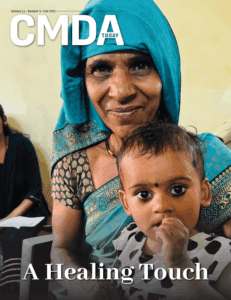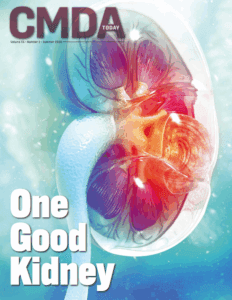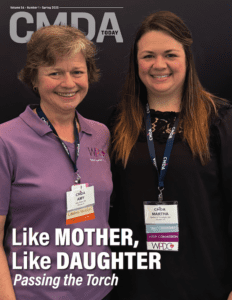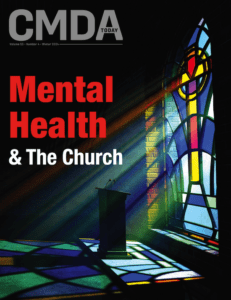Finishing Well: Preparing for Retirement
As a Christian healthcare professional, you have likely thought about retirement. It is either a distant dream, an approaching reality or a present experience. For some, it stirs positive thoughts and emotions, such as relief from the demands of work, opportunities to spend more time with family, the pursuit of long-deferred hobbies and travel to
by Steve Sartori, MD
As a Christian healthcare professional, you have likely thought about retirement. It is either a distant dream, an approaching reality or a present experience. For some, it stirs positive thoughts and emotions, such as relief from the demands of work, opportunities to spend more time with family, the pursuit of long-deferred hobbies and travel to foreign lands. For others, it incites anxieties surrounding health concerns, a lack of financial resources and the uncertainties of “what’s next.”
Many Christians eschew the term retirement, citing no biblical references to the term. If they are already tired, why would they want to be retired? The term is rebranded as “rewirement” or “refirement,” meaning the pursuit of an encore career or a new season of ministry. Whatever the case, for the healthcare professional, this term generally represents the season of life after the completion of a medical career.
If life is looked at like a triathlon, retirement represents the third phase of the event, the marathon. , the Bible offers the admonishment to run with perseverance the race God has marked out for us, ridding ourselves of things that hinder us and sins that entangle us. We are to keep our eyes on Jesus, who empowers us by faith to run the race at the pace of grace.
The beginning of this third season of life, this marathon, presents the challenge of navigating a multitude of concurrent transitions. Transitions are inherently risky, and sadly, for many, these transitions can leave them lonely, bored and unfulfilled. However, managed adeptly, these transitions offer opportunities to realize a deep sense of engagement, fulfilment and life satisfaction.
Perhaps the most challenging transition is the threat to identity and purpose. Most everyone, at some time or another, asks themselves four big questions: questions regarding origins, identity, purpose and destiny. These are questions like, “Where did I come from?”, “Who am I?”, “What am I here for?” and “Where am I going?” While most Christians would likely say they have settled the first and last questions, a number of new retirees struggle with the middle two—the questions of identity and purpose.
If your identity is rooted in your role as healthcare professional, and how you see yourself or how others see you, then retirement represents an existential threat to that core identity. If your identity is rooted in Christ, with how God sees you and who God says you are, then leaving a professional career or role does not significantly impact your identity. One of my mentors used to ask, “Does what you do determine who you are, or does who you are determine what you do?”
Healthcare professionals with a firmly anchored sense of identity in Christ, who seek the Lord for a renewed sense of calling and purpose after leaving their career, are often surprised by the opportunities discovered. Some have found God calling them to continue using their skills in the context of international or domestic missions. Others are influencing lives as a mentor, coach, consultant or peer supporter. Still others have identified roles within CMDA, working with students, residents or graduates, or they are engaged in unique encore careers.
Another challenging transition of retirement is the mindset regarding money. The shift from earning to spending, or from upsizing to downsizing or rightsizing, can be unsettling. Numerous healthcare professionals engage a financial advisor in this process. These discussions focus on net worth, asset allocation, budgeting, tax diversification, debt elimination, drawdown strategies, transitioning to Medicare, the timing of collecting Social Security benefits and estate and legacy planning.
Sometimes overlooked is a strategy for optimizing generosity. Scripture states, “A generous man will prosper; he who refreshes others will himself be refreshed” (Proverbs 11:25, NIV 1984). Financial advisors, when apprised of this intention, can assist in implementing tax-wise giving strategies, including the use of a donor-advised fund, a qualified charitable distribution or other charitable instruments. The joy of adhering to the adage, “do your giving while you’re living so you’re knowing where it’s going,” should not be underestimated. The CMDA Stewardship department stands poised and available to assist you in optimizing your generosity.
Yet another transition is moving from a highly demanding, highly structured work schedule to a less demanding, more flexible schedule. Having countless time choices predetermined for you during your career, you now find yourself with several more choices.
While some early retirees embrace the low-key, unstructured lifestyle initially, they often find themselves yearning for the satisfaction of productivity and achievement that comes from a more structured day. Most retirees have found that identifying a new routine, with adequate structure, nurtures their sense of purpose and productivity. A common question to new retirees is, “What are you doing with all of your free time?” Those who successfully establish a new time routine often respond, “What free time?”
The Harvard Study of Adult Development revealed the drivers of good health, happiness and overall life satisfaction. George Vaillant, the former director of the study, concluded that the warmth of relationships throughout life has the greatest impact on life satisfaction.[1] In short, he states, “Happiness is love.” Is it any wonder the Great Commandment is to love God, and to love your neighbor as yourself (Matthew 22:37-40)?
Retirement introduces several relational transitions. Relationships with colleagues and co-workers often grow distant, while relationships outside of work are given a renewed opportunity to flourish. Without relational initiatives and investments, loneliness can be the result.
Married couples must adapt to a “new normal.” Habits and routines that served the marriage during the healthcare career are now disrupted, sometimes resulting in unanticipated tensions. Several couples entering this season of marriage seek counseling for the first time to help nurture their marriage during this transition. When navigated well, this phase of married life can be mutually satisfying and enjoyable.
If the numerous transitions associated with retirement seem overwhelming, that is because they can be. If retirement is like a marathon, then training and preparation are imperative for a strong finish, and it is never too early to get started.
Whatever your season of life, you will do well to consider what a life worth living looks like and make choices now that move you forward in the direction that leads to a fulfilling, satisfying and meaningful life. Healthcare professionals without much life outside of healthcare often have difficulties with life after healthcare, so living well now is the best preparation for living well later.
Where do you start? Like any of life’s challenges, a good place to start is with Scripture, prayer and meditation. As a Christian, you can be assured on the authority of Scripture that God gives you everything you need for life and godliness (2 Peter 1:3), before and after retirement.
Major transitions take time to navigate. Don’t rush it. Some consultants recommend a protracted season of rest and reflection after closing out a professional career, like a sabbatical or the Old Testament practice of the Year of Jubilee. Although it is easy to fill the daily schedule quickly with a variety of new commitments, be careful as you can even experience burnout as a retiree.
While there are several commonalities among retirement journeys, everyone is unique, best served by a customized individual retirement plan. Competent financial planners, coaches, mentors and peers recognize this. Choosing competent professionals as part of your support team can be immensely helpful. As the Bible states, “Plans fail for lack of counsel, but with many advisers they succeed” (Proverbs 15:22).
How can CMDA help? I’m glad you asked. At the CMDA Center for Well-Being, several certified professional coaches offer coaching to CMDA members at a markedly reduced fee. These coaches are familiar with the principles of change and transition and are experienced in coming alongside healthcare professionals on their retirement journey. As Christians, CMDA coaches often facilitate the spiritual growth of their clients also.
If you are approaching retirement, don’t hesitate to reach out to a CMDA coach to accompany you on this journey. Quite a few CMDA retirees have benefitted from this professional relationship. It is a sign of strength and wisdom to reach out to a Christian coach as you seek the Lord during this next season of life.
For some retirees, who wish to grow their influence in the lives of others, acquiring the skills of coaching and mentoring can equip them with the tools they need for promoting growth in others. The CMDA Center for Well-Being offers several courses on coaching and mentoring each year. Information about these courses is updated regularly at cmda.org/coaching.
Future CMDA considerations to serve retirees include group coaching cohorts facilitated by a professional CMDA coach. These cohorts will gather virtually to explore topics pertaining to retirement. The coach will facilitate conversations that will prompt each participant to establish an Individual Retirement Plan. The proposed kickoff date is fall 2024.
Stay tuned, and may you finish the race at the pace of grace.
About The Author
Dr. Steve Sartori is a certified life and leadership coach, who helps doctors and other healthcare professionals optimize well-being, enhance leadership skills, and navigate retirement. A graduate of The Medical College of Wisconsin, he has been chief of staff at two hospitals, faculty member for a family medicine residency program, and chief medical officer for a community health center. He has served CMDA as a board member and founding Director of the Center for Well-being. He is married, with two daughters and five grandchildren, and enjoys traveling and sports. An avid fan of the Green Bay Packers, he can sometimes be seen wearing a cheesehead.
Learn More
CMDA’s expanding team of experienced, certified coaches, all of whom are seasoned CMDA members, have walked alongside hundreds of Christian healthcare professionals for well over a decade. We offer professional coaching and coaching training at a reduced fee for CMDA members like you, to help with:
- Life and career transitions
- Preparing to thrive in retirement
- Leadership development
- Burnout prevention and recovery
- Spiritual growth
- Decision making
- Improving communication skills
- Understanding and developing your strengths
- And more
In addition to coaching on all types and stages of transition, we teach and speak on topics related to transition, change, burnout, mentoring, spiritual growth and leadership. While we believe you are the best expert on your life, we bring our expertise in coaching to help you know yourself and God better so you can align your life with who you are and how He is calling you. Coaching can also help you identify damaging beliefs and identities you’ve picked up from healthcare training so you can examine and replace them with what you truly believe and how God sees you. This sets you up for living and working from a full bucket filled with God’s grace. In essence, our mission is to help you align with God, optimize your well-being and maximize your influence.
To connect with one of our coaches, email [email protected]. To learn more or register for a continuing education-accredited course, visit cmda.org/coaching or cmda.org/wellbeing.
[1] Vaillant G. Triumphs of Experience: The Men of the Harvard Grant Study. Cambridge: The Belknap Press; 2012.




